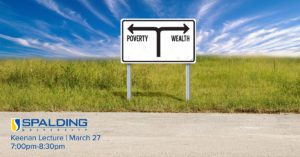The Rev. Elizabeth Hinson-Hasty, who is the faculty chair of theology at Bellarmine University, will give the Spalding University Keenan Lecture from 7-8:30 p.m. March 27, 2018 in the lectorium of the Egan Leadership Center, 901 S. Fourth St. It’s a free, public event.
Hinson-Hasty is an author and a frequent public speaker on the church’s role in addressing issues of social and economic justice. You can read her professional bio and curriculum vitae at this link.
The title of her lecture will be “Insights from the World’s Great Religious Traditions for an Alternative Social Logic,” and Hinson-Hasty will discuss why she reframes the debates over poverty, wealth inequalities and the destruction of our natural environment from the perspective of the problem of wealth. As the lecture title suggests, she’ll offer insights from religious traditions for an alternative social logic about the issues of wealth.
She plans to spend most of the second half of the lecture taking questions from the audience. Those attending or interested in the subject matter are encouraged to use the hashtag #imagineweareone on social media.
The Keenan Lecture is an annual discussion of religious themes that’s presented by Spalding’s School of Liberal Studies.
Hinson-Hasty is author of three books, including most recently last summer’s “The Problem of Wealth: A Christian Response to a Culture of Affluence.” Her Keenan Lecture will be related to topics in that book. She also wrote “Dorothy Day for Armchair Theologians” in 2014 and “Beyond the Social Maze: Exploring Vida Dutton Scudder’s Theological Ethics” in 2006. She was a c0-editor of two other books, both published in 2008 – “Prayers for a New Social Awakening” and “To Do Justice: Engaging Progressive Christians in Social Action.”
Here’s an interview with Hinson-Hasty that gives more insight on what to expect from her lecture.
Can you summarize some of what you hope to talk about?
What I’m interested in doing is to highlight why I framed the issue of wealth inequalities and responses to poverty as the problem of wealth. But then in the lecture, I also want to emphasize what religious traditions offer as an alternative. So I’ll highlight at Islamic banking and look at Buddhist ecomonics as well as give some specific examples of things people have done to address wealth inequalities. My hope is to really get into conversation with people about what the alternatives may look like. There are some examples in the book, “The Problem of Wealth,” that actually come from the Louisville area, and I’ll offer some of those specific examples.
How do you describe what your newest book is about?
It is about reframing debates on poverty and wealth inequalities from the perspective of how we create wealth and why that matters. I look at the two dominant forms of wealth creation in the U.S. but also the larger global economy and highlight the impact, particularly, of how neoliberalism arguably accelerates poverty and creates poverty in the U.S. and worldwide. So it’s a challenge to that to think about, what then are the policies and also the practices that invite us to live by an alternative social logic?
Everyone is invited and encouraged to come obviously, but who more specifically are the types of people you think would be interested in coming to hear your Keenan Lecture?
Definitely religious leaders. Also, I recently gave a series of lectures related to the book at Austin College in Sherman, Texas, and who came there were economists on the faculty and also local people who are involved in alternative forms of businesses, you know, smaller businesses. I would say who would be interested would be anyone who is concerned about wealth inequality and the impact on U.S. society and what that means to basic necessities like education and food. There are a variety of groups.
Why do you think people should look at religious traditions to extrapolate lessons about economics and societal issues?
Primarily, because historically, economics is always taught alongside history, moral philosophy or theology. It wasn’t until the late 19th or early 20 century that the disciplines were separated. Actually it’s more recent that the Western academy has separated out economics as a standalone discipline. The term “economics” is rooted in the Greek work, “oikos,” which means household. In theological writings, that refers to managing right relationships in God’s household. … What I’m trying to do is to reclaim that earlier emphasis (of economics being tied to other disciplines). It’s just to say, OK, I’m a religious leader and a theologian, but economics and business and wealth creation shouldn’t be separate from questions of ethics and philosophy and theology and history and other disciplines. I think that partly is what has led to the huge wealth divide that we see in the U.S. and globally today. We have to bring the conversation back into the kind of complex web that really it’s mired in.
Your book describes learning “the ethic of enough.” Can you speak to that?
There are a number of questions raised about that in the book, even about how we define what wealth is. In U.S. society, we think about wealth as a material success. But that’s not true in all cultures. We’re kind of impoverished in that way in the U.S. that we’re not as well-aware that wealth is also abundance in relationships and understanding that we’re part of the larger web of life. From others’ perspective, that’s part of our poverty. … All the world’s great religions really question if the unlimited right of individuals to increase their own wealth is a good in itself. You see in each of the religious traditions a kind of alternative social logic that emerges.
